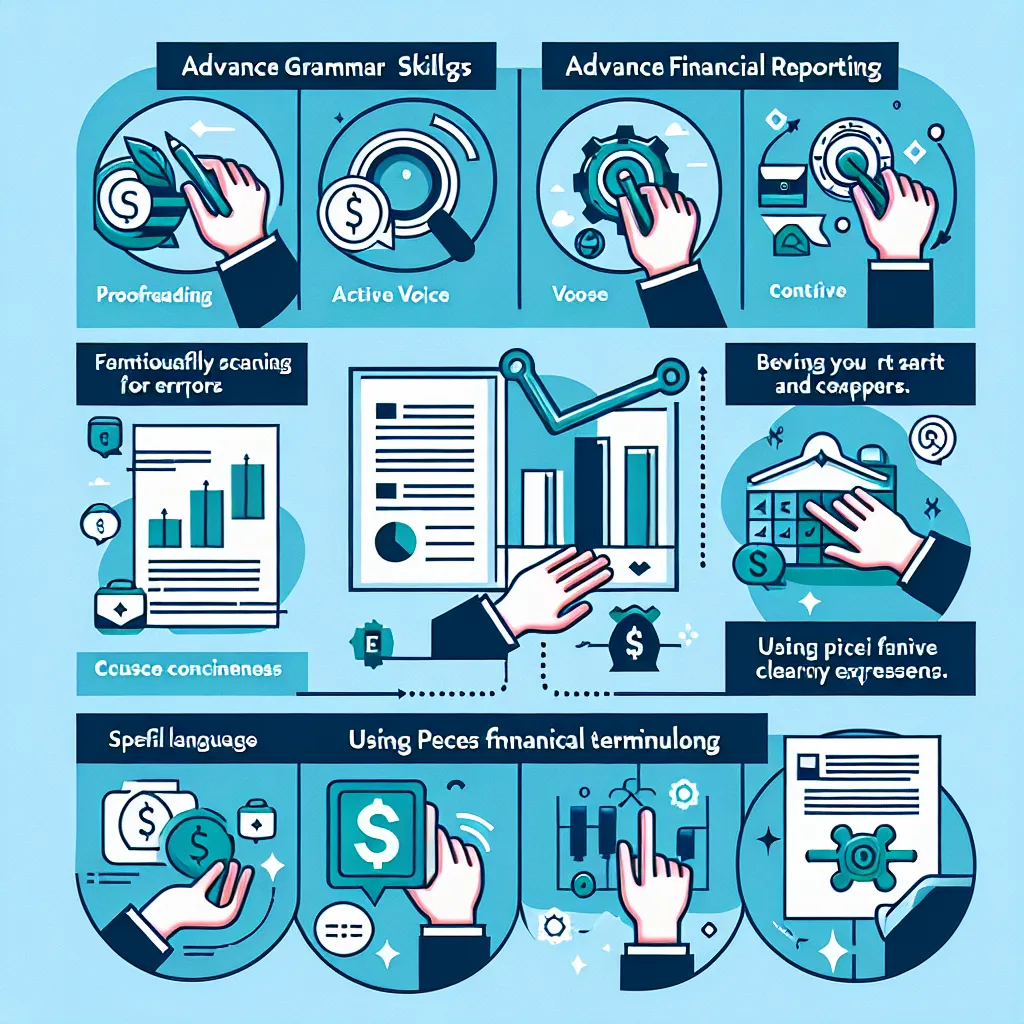Financial reports are crucial documents in the business world, presenting a company’s financial health and performance. Ensuring grammatical accuracy in these reports is paramount to convey information clearly and professionally. This guide will help you master the art of Perfecting Grammar For Financial Reports, enhancing your credibility and effectiveness in financial communication.
Understanding the Importance of Grammar in Financial Reporting
Proper grammar in financial reports is essential for several reasons:
- Clarity of information: Accurate grammar ensures that financial data and analysis are communicated clearly, reducing the risk of misinterpretation.
- Professionalism: Well-written reports reflect positively on the company and the author, enhancing credibility.
- Compliance: Many regulatory bodies require precise language in financial documents, making grammatical accuracy a legal necessity.
- Global communication: In an international business environment, clear grammar aids non-native English speakers in understanding the reports.
 Importance of Grammar in Financial Reports
Importance of Grammar in Financial Reports
Common Grammatical Challenges in Financial Reports
1. Subject-Verb Agreement
Ensure that the subject and verb in a sentence agree in number. This can be tricky with collective nouns or complex subjects.
Example:
Incorrect: The board of directors have approved the budget.
Correct: The board of directors has approved the budget.
2. Proper Use of Tenses
Consistency in tense usage is crucial, especially when describing financial events and their impacts.
Example:
Incorrect: The company increased its revenue last year and is expanding its market share.
Correct: The company increased its revenue last year and expanded its market share.
3. Parallel Structure
Maintain parallel structure in lists and comparisons to improve readability and clarity.
Example:
Incorrect: The CFO is responsible for managing the budget, financial reporting, and to oversee investments.
Correct: The CFO is responsible for managing the budget, reporting financials, and overseeing investments.
4. Proper Use of Articles
The correct use of ‘a’, ‘an’, and ‘the’ is essential in financial writing.
Example:
Incorrect: Company experienced a 15% growth in Q3.
Correct: The company experienced a 15% growth in Q3.
5. Avoiding Dangling Modifiers
Ensure that modifiers clearly refer to the intended subject.
Example:
Incorrect: After reviewing the financial statements, discrepancies were found by the auditors.
Correct: After reviewing the financial statements, the auditors found discrepancies.
Tips for Improving Grammar in Financial Reports
-
Use active voice: It makes your writing more direct and clear.
Example: “The company increased profits” instead of “Profits were increased by the company.” -
Be concise: Avoid unnecessary words and phrases.
Example: “due to the fact that” can be replaced with “because.” -
Use specific language: Replace vague terms with precise ones.
Example: “a significant amount” should be replaced with the exact figure or percentage. -
Proofread multiple times: Read your report several times, focusing on different aspects each time (e.g., tenses, agreement, punctuation).
-
Use grammar-checking tools: Utilize software like Grammarly or Microsoft Word’s built-in grammar checker as a first line of defense.
-
Get a second opinion: Have a colleague review your report for clarity and grammatical accuracy.
-
Stay updated on financial terminology: Ensure you’re using the most current and accurate financial terms.
 Tips for Improving Financial Report Grammar
Tips for Improving Financial Report Grammar
Advanced Grammar Considerations for Financial Reports
Proper Use of Semicolons and Colons
Semicolons can connect closely related independent clauses, while colons introduce lists or explanations.
Example:
The company faced three major challenges: declining market share; increased competition; and rising raw material costs.
Correct Placement of Modifiers
Ensure that modifiers are placed close to the words they modify to avoid confusion.
Example:
Incorrect: The CFO only approved expenses over $10,000.
Correct: The CFO approved only expenses over $10,000.
Consistent Use of Oxford Comma
While style guides differ, consistency in using or omitting the Oxford comma is crucial.
Example:
The report covers revenue, expenses, and projections.
Conclusion
Perfecting grammar for financial reports is a critical skill that enhances the clarity, professionalism, and effectiveness of your financial communication. By focusing on common challenges, implementing improvement tips, and paying attention to advanced grammatical considerations, you can significantly elevate the quality of your financial reports. Remember, clear and accurate grammar not only improves understanding but also builds trust with your readers, be they stakeholders, regulators, or colleagues.
For more insights on enhancing your financial writing skills, check out our articles on advanced grammar for corporate reports and advanced grammar for professional communication.
Continuous practice and attention to detail will help you master the art of grammatically perfect financial reporting, setting you apart in the competitive world of finance and business communication.




